#Black Americans Demand Reparations
Explore tagged Tumblr posts
Text
Should America Pay Reparations Now?
The subject of reparations for Black Americans is a complex and deeply debated issue in the United States, rooted in the country's history of slavery and systemic discrimination. Here's a breakdown of the key points and arguments, without taking a definitive stance:
Arguments in Favor of Reparations
Moral Imperative: Advocates argue that reparations are a way to acknowledge the centuries of unpaid labor, suffering, and systemic discrimination endured by enslaved Africans and their descendants. They emphasize that the legacy of slavery continues to manifest as a racial wealth gap and other socioeconomic disparities.
Economic Justice: Proponents contend that reparations would help address the persistent economic inequality between Black and white Americans. The wealth gap resulting from historical injustices directly impacts opportunities for housing, education, and well-being.
Historical Precedent: There are instances where governments have offered reparations to groups who have suffered historical injustices, such as the compensation for Japanese Americans interned during World War II.
Arguments Against Reparations
Practical Challenges: Opponents raise concerns about the difficulties in determining who qualifies for reparations and how they should be distributed.
Divisiveness: Some believe reparations could fuel racial tensions rather than bring healing and reconciliation.
Accountability: The argument is made that since those who directly committed the injustices of slavery are long dead, present-day Americans should not bear responsibility.
Forms of Reparations
Proposed forms of reparations go beyond direct financial payments and include:
Investments in Black communities: Funding for education, housing, business development, and healthcare in underserved Black communities.
Apologies and Acknowledgement: Formal apologies from the government for slavery and its ongoing legacy.
Educational Initiatives: Comprehensive education on the history of slavery and its influence on contemporary American society.
How Much and When?
No Consensus: There is no clear agreement on the amount or timing of reparations. Estimates vary widely, with some advocates calling for trillions of dollars, while others suggest more targeted programs.
Ongoing debate: This remains a highly contentious topic. Organizations and politicians are engaged in ongoing discussions on whether reparations are due, the best way to implement them, and the appropriate amount.
Important Considerations
The reparations debate is multifaceted. It's crucial to approach it with an understanding of the historical context, the ongoing impact of systemic racism, and the diverse range of perspectives on this complex issue.
The potential social and political implications of paying reparations to Black Americans are significant and far-reaching. Here's a breakdown of some of the key areas that would likely be affected:
Social Implications
Racial Reconciliation: Reparations could be a step towards acknowledging and addressing the deep-seated pain and trauma of slavery and its enduring legacy. It could potentially help move the nation towards greater racial healing.
Empowerment of Black Communities: Investment in historically disadvantaged communities could lead to significant improvements in education, housing, business ownership, and healthcare. This could help level the playing field and reduce the persistent racial wealth gap.
Shift in Narratives: Reparations could trigger a shift in the national narrative around race and the history of slavery. This could lead to more comprehensive and honest education about these issues.
Potential Backlash: There's a risk of backlash from those who oppose reparations, potentially leading to increased racial tensions and resentment.
Political Implications
Partisan Divide: Reparations are a highly divisive issue, mainly along partisan lines. Democrats generally tend to be more supportive of reparations, while Republicans are generally opposed. This could become a further wedge issue between the two major political parties.
Shift in Political Power: Successful implementation of reparations could lead to increased political power and influence for Black communities. This may impact voting patterns and political representation.
Mobilization: The debate over reparations could galvanize political activism both for and against the issue. This could significantly impact elections, policymaking, and political discourse.
International Attention: Reparations could draw international attention and potentially spur similar discussions in other countries with histories of slavery and racial injustice.
Challenges and Considerations
Determining Eligibility: Implementing a reparations program would involve complex debates about who is eligible, based on factors like ancestry and the extent of harm suffered.
Form of Reparations: Decisions would need to be made about the appropriate forms of reparations, whether direct payments, investments in communities, or a combination of approaches.
Political Will: Building the necessary political will for a reparations program would be a significant challenge, given the current polarization of American politics.
In Conclusion
The social and political implications of paying reparations to Black Americans would be profound and complex. While the concept has the potential to initiate healing and address historical injustice, it also carries the risk of division and backlash. The debate about reparations is likely to continue as a significant social and political issue in the years to come.
---------------------------
Google wrote this short essay, so when you are looking for clarity on issues, use google to find the talking points first; and then expand on them with historical context and signifiers.
FREE THE LAND / REPARATIONS NOW!
1 note
·
View note
Text
Brennan’s statement on Palestine :
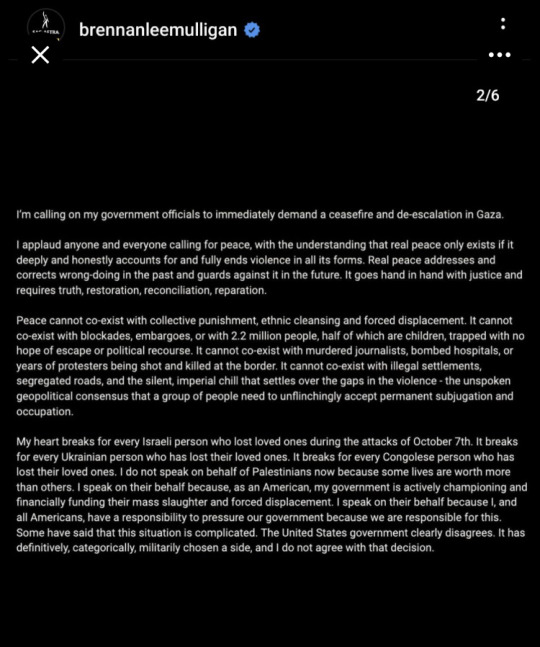
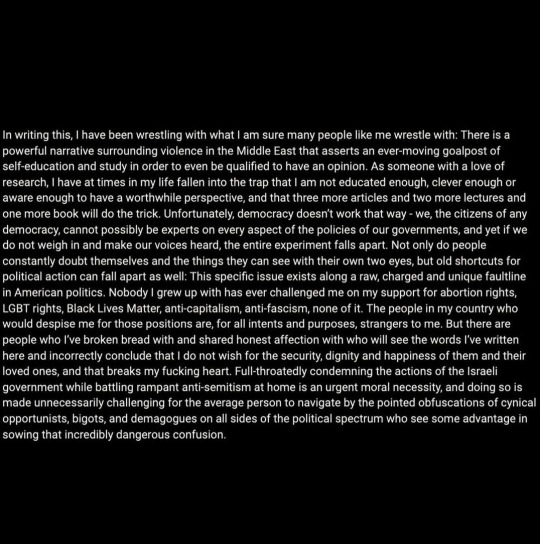
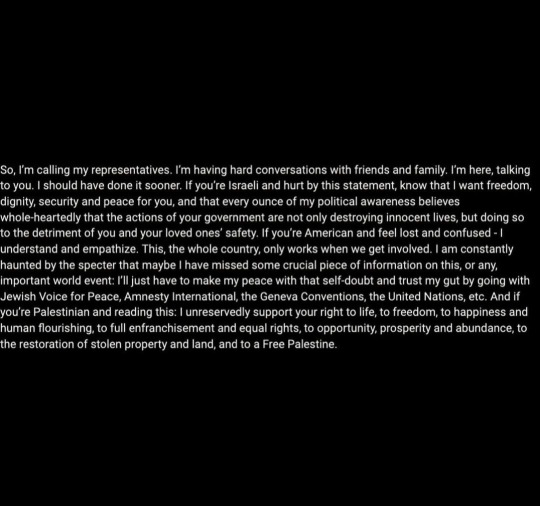
[ ID: Statement from Brennan Lee Mulligan, on Instagram. It consists of three black squares with plain white text. The text reads as follows:
"I'm calling on my government officials to immediately demand a ceasefire and de-escalation in Gaza.
I applaud anyone and everyone calling for peace, with the understanding that real peace only exists if it deeply and honestly accounts for and fully ends violence in all its forms. Real peace addresses and corrects wrong-doing in the past and guards against it in the future. It goes hand in hand with justice and requires truth, restoration, reconciliation, reparation.
Peace cannot co-exist with collective punishment, ethnic cleansing and forced displacement. It cannot co-exist with blockades, embargoes, or with 2.2 million people, half of which are children, trapped with no hope of escape or political recourse. it cannot co-exist with murdered journalists, bombed hospitals, or years of protesters being shot and killed at the border. it cannot co-exist with illegal settlements, segregated roads, and the silent, imperial chill that settles over the gaps in the violence - the unspoken geopolitical consensus that a group of people need to unflinchingly accept permanent subjugation and occupation.
My hear breaks for every Israeli person who lost loved ones during the attacks of October 7th. It breaks for every Ukrainian person who has lost their loved ones. It breaks for every Congolese person who has lost their loved ones. I do not speak on behalf of Palestinians now because some lives are worth more than others. I speak on their behalf because I, and all Americans, have a responsibility to pressure our government because we are responsible for this. Some have said that this situation is complicated. The Unites States government clearly disagrees. It has definitively, categorically, militarily chosen a side, and I do not agree with that decision.
In wiring this, I have been wrestling with what I am sure many people like me wrestle with: There is a powerful narrative surrounding violence in the Middle East that asserts and ever-moving goalpost of self-education and study in order to even be qualified to have an opinion. As someone with a love of research, I have at times in my life fallen into the trap that I am not educated enough clever enough, or aware enough to have a worthwhile perspective, and that three more articles and two more lectures and one more book will do the trick. Unfortunately, democracy doesn't work that way - we, the citizens of any democracy, cannot possibly be experts on every aspect of the policies of our governments, and yet if we do not constantly weigh in an make our voices heard, the entire experiment falls apart. Not only do people constantly doubt themselves and the things they can see with their own two eyes, but old shortcuts for political action can fall apart as well: This specific issue exists along a raw, charged and unique faultline in American Politics. Nobody I grew up with has ever challenged me on my support for abortion rights, LGBT rights, Black Lives Matter, anti-capitalism, anti-fascism, none of it. The people in my country who would despise me for those positions are, for all intents and purposes, strangers to me. But there are people who I've broken bread with and shared honest affection with who will see the words I've written here and incorrectly conclude that I do not wish for the security, dignity and happiness of them and their loved ones, and that breaks my fucking heart. Full-throatedly condemning the actions of the Israeli government while battling rampant anti-semitism at home is an urgent moral necessity, and doing so is made unnecessarily challenging for the average person to navigate by the pointed obfuscations of cynical opportunists, bigots, and demagogues on all sides of the political spectrum who see some advantage in sowing that incredibly dangerous confusion.
So, I'm calling my representatives. I'm having hard conversations with friends and family. I'm here, talking to you. I should have done it sooner. If you're Israeli and hurt by this statement, know that I want freedom, dignity, security and peace for you, and that every ounce of my political awareness believes whole-heartedly that the actions of your government are not only destroying innocent lives, but doing so to the detriment of you and your loved ones' safety. If you're American and feel lost and confused - I understand and empathize. This, the whole country, only works when we get involved. I am constantly haunted by the specter that maybe I missed some crucial piece of information on this, or any, important world event. I'll just have to make my peace with that self-doubt and trust my gut by going with Jewish Voice for Peace, Amnesty International, the Geneva Conventions, the United Nations, etc. And if you're Palestinian and reading this: I unreservedly support your right to life, to freedom, to happiness and human flourishing, to full enfranchisement and equal rights, to opportunity, prosperity and abundance, to the restoration of stolen property and land, and to a Free Palestine." End ID ]
#if anyone wants to do the id I will love you forever btw#brennan lee mulligan#d20#dropout#free palestine#dimension 20#I babble
7K notes
·
View notes
Text
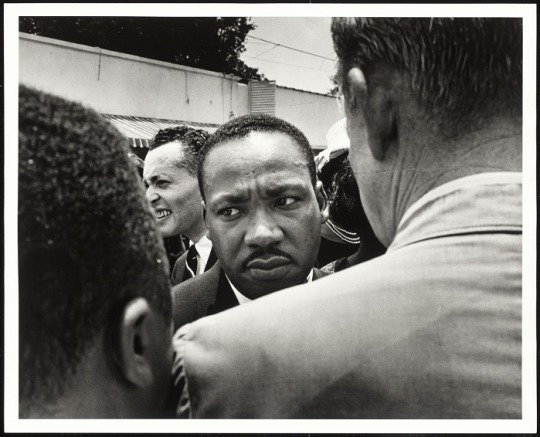
Your annual reminder that Martin Luther King Jr. was a revolutionary who made the foundational case for reparations and openly spoke about the US needing to stop funding wars, genocide and the exploitation of poor Black and Brown people's labor and right to exist. If he weren't assassinated by the US government, he would have demanded an end to the US funded arming of Israel and called for an immediate ceasefire.
"American power should be “harnessed to the service of peace and human beings, not an inhumane power [unleashed] against defenseless people" (King, 25 February 1967).
Recommended Reading:

Click <-
244 notes
·
View notes
Text


Why The Honourable Marcus Garvey Was Proven Correct and W.E.B. Du Bois Was Proven Wrong: A Garveyite Perspective
Introduction
The ideological battle between Marcus Garvey and W.E.B. Du Bois was one of the most defining conflicts in Black political history. Du Bois, a Harvard-educated intellectual and a leader of the NAACP (National Association for the Advancement of Colored People), saw Garvey as a reckless demagogue. In contrast, Garvey saw Du Bois as an elitist gatekeeper who sought to integrate Black people into a system that would never truly accept them.
From a Garveyite perspective, history has vindicated Marcus Garvey’s vision of Black nationalism, economic self-sufficiency, and Pan-Africanism while exposing the limitations of Du Bois’ integrationist strategy.
This analysis explores:
How Garvey’s predictions about Black self-reliance, Pan-Africanism, and economic control came true.
How Du Bois’ integrationist model ultimately failed Black America.
Why Du Bois’ elitism and colourism created division within the Black struggle.
The modern relevance of Garvey’s teachings compared to Du Bois’ outdated ideology.
1. Marcus Garvey’s Vision Was Proven Correct
1.1 The Failure of Integration and the Continued Economic Oppression of Black Americans
Du Bois believed in integration, arguing that Black people should seek acceptance in white society through education, politics, and activism.
Garvey, on the other hand, warned that integration would only result in continued Black economic and political dependency.
Decades after the Civil Rights Movement, Black people in the U.S. still suffer from:
Economic exclusion (higher Black unemployment, wage gaps, and lack of generational wealth).
Mass incarceration (systematic targeting of Black men under policies like the War on Drugs).
Police brutality and voter suppression, proving that legal "equality" has not ended systemic racism.
Garveyite Perspective: Garvey was right—white America was never going to fully accept Black people as equals. The dream of assimilation was always a lie.
1.2 The Global Black Struggle Proves Pan-Africanism Was the Answer
Garvey taught that Black people across the world must unite as one people—economically, politically, and culturally.
Du Bois initially dismissed Pan-Africanism, focusing on Black progress within the U.S. rather than seeing the struggle as global.
Today, Pan-Africanism is seen as the key to Black empowerment, with movements such as:
The African Union, pushing for economic self-sufficiency in Africa.
The CARICOM reparations campaign, demanding justice from former colonizers.
The Buy Black and economic nationalism movements, reinforcing Garvey’s call for Black self-reliance.
Garveyite Perspective: Garvey was right again—Black people can not rise if they continue to depend on white institutions. Global Black unity is the only way forward.
2. W.E.B. Du Bois’ Vision Was Proven Wrong
2.1 The Failure of the "Talented Tenth" and the Betrayal of the Black Masses
Du Bois promoted the "Talented Tenth" theory, believing that an elite group of educated Black leaders should guide the race.
This strategy failed because:
It created a class divide, with elite Black intellectuals looking down on the working-class majority.
Many of these "Talented Tenth" leaders abandoned the Black masses once they gained access to white society.
It depended on white institutions, which ensured that Black people never built their own power structures.
Garveyite Perspective: Garvey understood that the fate of the race depended on the strength of the Black masses—not a small group of privileged intellectuals seeking white approval.
2.2 Du Bois’ Hypocrisy: From Integrationist to Pan-Africanist
Du Bois spent most of his career attacking Garvey, calling him a "fraud" and a "dangerous agitator."
But later in life, Du Bois himself embraced Pan-Africanism and moved to Ghana!
This proves that Du Bois knew Garvey was right all along but wasted years fighting against him instead of working towards the same goal.
Garveyite Perspective: Du Bois realized too late that integration was a dead end. Had he supported Garvey’s movement instead of fighting it, Black people might have been decades ahead in their struggle for sovereignty.
3. Du Bois’ Elitism and Light-Skinned Supremacy
3.1 Du Bois’ Colourism and Disdain for Dark-Skinned Black People
Du Bois came from a privileged, light-skinned background and often expressed disdain for darker-skinned Black people.
He described Garvey as:
"A little, fat, black man, ugly but with intelligent eyes and a big head."
This was a direct attack on Garvey’s dark skin and African features.
Du Bois’ colourism reflected the same white supremacist ideals he claimed to fight against.
Garveyite Perspective: Du Bois’ elitism and colourism weakened the Black movement by creating unnecessary division instead of unity.
3.2 The Psychological Damage of the Integrationist Mentality
By promoting integration over self-reliance, Du Bois conditioned Black people to seek white approval rather than build their own power.
This led to:
Black dependence on white-owned businesses, rather than fostering Black economic self-sufficiency.
The destruction of Black-owned economies like Tulsa (Black Wall Street), as Black elites abandoned their own people in pursuit of white spaces.
A generational mindset of inferiority, where success is measured by how much a Black person assimilates into white culture.
Garveyite Perspective: Du Bois’ philosophy created a cycle where Black people keep chasing white validation instead of building their own independent systems.
4. The Modern Relevance of Garvey’s Teachings vs. Du Bois’ Outdated Ideology
4.1 Why Garvey’s Message is Still the Blueprint for Black Liberation
Today, Black people are rediscovering Garvey’s model of self-determination, seen through:
The resurgence of Buy Black movements.
A push for reparations and land ownership.
The growing movement of African repatriation and investment.
Meanwhile, Du Bois’ integrationist approach has failed to eliminate systemic racism, poverty, or police brutality.
Garveyite Perspective: We are now living in the reality Garvey warned about—Black people must abandon Du Bois’ failed approach and fully embrace self-reliance and Pan-Africanism.
5. Conclusion: Marcus Garvey Was Right, W.E.B. Du Bois Was Wrong
From a Garveyite perspective, the historical record proves that:
Garvey was correct about the failure of integration and the need for economic self-sufficiency.
Du Bois’ reliance on white institutions only led to continued oppression.
Pan-Africanism, not assimilation, remains the key to Black liberation.
Du Bois’ elitism and colourism created division within the Black movement.
Garvey’s Final Insight:
"We must remove from our people the idea that they can be dependent upon others for success. The Negro must be self-reliant. In culture, in commerce, in politics, we must strike out for ourselves!"
Today’s Black activists must fully embrace Garvey’s vision, reject the failed integrationist approach, and focus on building independent Black power.
#black history#black people#blacktumblr#black#black tumblr#pan africanism#black conscious#africa#black power#black empowering#marcus garvey#WEB Du Bois#black liberation#reparations now#Black Nationalism#economicfreedom#black community#african diaspora#black diaspora#self determination#black pride
29 notes
·
View notes
Text
Black Americans have been demanding compensation and restitution for their suffering since the end of the Civil War. 40 Acres and a Mule remains the nation’s most famous attempt to provide some form of reparations for American slavery. Today, it is largely remembered as a broken promise and an abandoned step toward multiracial democracy. Less known is that the federal government actually did issue hundreds, perhaps thousands, of titles to specific plots of land between 4 and 40 acres. Freedmen and women built homes, established local governments, and farmed the land. But their utopia didn’t last long. After President Abraham Lincoln was assassinated, his successor, Andrew Johnson, stripped property from formerly enslaved Black residents across the South and returned it to their past enslavers. Over the course of two and a half years, a team of Public Integrity reporters, editors, and researchers identified 1,250 Black men and women who had earned land as reparations after the Civil War. From there, the team conducted genealogical research to locate living descendants of many of those who had received and then lost the land. For the first time, these living Black Americans were made aware of the specific land that had been given to and then taken away from their ancestors. This project is an unprecedented and innovative use of Freedmen’s Bureau records—an impossible task for most of American history, until recent advances in genealogical research and the digitization of thousands of pages of Reconstruction-era documents made it feasible.
"Forty Acres and a Lie": incredible work in investigative journalism from Reveal
59 notes
·
View notes
Text
brennan's statement on instagram
I'm calling on my government officials to immediately demand a ceasefire and de-escalation in Gaza.
I applaud anyone and everyone calling for peace, with the understanding that real peace only exists if it deeply and honestly accounts for and fully ends violence in all its forms. Real peace addresses and corrects wrong-doing in the past and guards against it in the future. It goes hand in hand with justice and requires truth, restoration, reconciliation, reparation.
Peace cannot co-exist with collective punishment, ethnic cleansing and forced displacement. It cannot co-exist with blockades, embargoes, or with 2.2 million people, half of which are children, trapped with no hope of escape or political recourse. It cannot co-exist with murdered journalists, bombed hospitals, or years of protesters being shot and killed at the border. It cannot co-exist with illegal settlements segregated roads, and the silent, imperial chill that settles over the gaps in the yiolence - the unspoken geopolitical consensus that a group of people need to unflinchingly accept permanent subjugation and occupation.
My heart breaks for every Israeli person who lost loved ones during the attacks of October 7th. It breaks for every Ukrainian person who has lost their loved ones. It breaks for every Congolese person who has lost their loved ones. I do not speak on behalf of Palestinians now because some lives are worth more than others. I speak on their behalf because, as an American, my government is actively championing and financially funding their mass slaughter and forced displacement.I speak on their behalf because l, and all Americans, have a responsibility to pressure our government because we are responsible for this. Some have said that this situation is complicated. The United States government clearly disagrees. It has definitively, categorically, militarily chosen a side, and I do not agree with that decision.
In writing this, I have been wrestling with what I am sure many people like me wrestle with: There is a powerful narrative surrounding violence in the Middle East that asserts an ever-moving goalpost of self-education and study in order to even be qualified to have an opinion. As someone with a love of research, I have at times in my life fallen into the trap that I am not educated enough, clever enough or aware enough to have a worthwhile perspective, and that three more articles and two more lectures and one more book will do the trick. Unfortunately, democracy doesn't work that way - we, the citizens of any democracy, cannot possibly be experts on every aspect of the policies of our governments, and yet if we do not weigh in and make our voices heard, the entire experiment falls apart. Not only do people constantly doubt themselves and the things they can see with their own two eyes, but old shortcuts for political action can fall apart as well: This specific issue exists along a raw, charged and unique faultline in American politics. Nobody I grew up with has ever challenged me on my support for abortion rights, LGBT rights, Black Lives Matter, anti-capitalism, anti-fascism, none of it. The people in my country who would despise me for those positions are, for all intents and purposes, strangers to me. But there are people who l've broken bread with and shared honest affection with who will see the words l've written here and incorrectly conclude that I do not wish for the security, dignity and happiness of them and their loved ones, and that breaks my fucking heart. Full-throatedly condemning the actions of the Israeli government while battling rampant anti-semitism at home is an urgent moral necessity, and doing so is made unnecessarily challenging for the average person to navigate by the pointed obfuscations of cynical opportunists, bigots, and demagogues on all sides of the political spectrum who see some advantage in sowing that incredibly dangerous confusion.
So, I'm calling my representatives. I'm having hard conversations with friends and family. I'm here, talking to you. I should have done it sooner. If you're Israeli and hurt by this statement, know that I want freedom, dignity, security and peace for you, and that every ounce of my political awareness believes whole-heartedly that the actions of your government are not only destroying innocent lives, but doing so to the detriment of you and your loved ones' safety. If you're American and feel lost and confused - I understand and empathize. This, the whole country, only works when we get involved. I am constantly haunted by the specter that maybe I have missed some crucial piece of information on this, or any, important world event: I'Il just have to make my peace with that self-doubt and trust my gut by going with Jewish Voice for Peace, Amnesty International, the Geneva Conventions, the United Nations, etc. And if you're Palestinian and reading this: I unreservedly support your right to life, to freedom, to happiness and human flourishing, to full enfranchisement and equal rights, to opportunity, prosperity and abundance, to the restoration of stolen property and land, and to a Free Palestine.
138 notes
·
View notes
Text

Audley “Queen Mother” Moore (July 27, 1898 - May 2, 1997) prominent Harlem civil rights activist, was born in New Iberia, Louisiana to Ella and St. Cry Moore. She educated herself by reading the writings of Frederick Douglass and listening to the speeches of Marcus Garvey.
Moved by the Black Nationalist message in a speech Marcus Garvey gave in New Orleans, she migrated to Harlem in 1922. She became a member and then a leader within Garvey’s Universal Negro Improvement Association. A proud shareholder in the Black Star Line, she helped organize UNIA conventions in New York. She married Frank Warner in 1922. They had one son.
After the demise of the UNIA, she founded several organizations. She founded and served as president of the Universal Association of Ethiopian Women. She founded the Committee for Reparations for Descendants of US Slaves, and The Republic of New Africa, which demanded self-determination, land, and reparations for African Americans. During the height of the Cold War, she presented a petition to the UN in 1957 which demanded land and billions in reparations for people of African descent and it requested direct support for African Americans who sought to immigrate to Africa.
She focused on local issues. She participated in a sit-in at a Board of Education meeting in Brooklyn. She and the other protesters said board members failed to adequately fund schools in African American communities. She served as the bishop of the Apostolic Orthodox Church of Judea and she co-founded the Commission to Eliminate Racism, Council of Churches of Greater New York.
While attending the funeral of former Ghanaian President Kwame Nkrumah, the Ashanti ethnic group bestowed upon her the honorary title “Queen Mother.” The Corcoran Gallery of Art in DC. honored Moore and 40 other famous Black women in Brian Lanker’s photo exhibit, “I Dream a World.”
Her activism continued through the mid-1990s, and she made her final public appearance at the Million Man March in 1995. She was survived by her son, five grandchildren, and a great-grandson. #africanhistory365 #africanexcellence
40 notes
·
View notes
Text
Jamaal Bowman: The Cost of being 'Off Code'
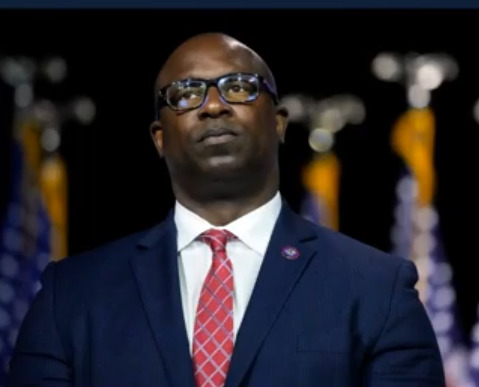
Jamaal Bowman IS the Canary in the Coal Mine for the Congressional Black Caucus (CBC). His Primary defeat to [Race Baiter] George Latimer sends a CLEAR MESSAGE to the rest of the CBC, that they need to pay more attention to Black Specific Issues. For decades, they rode into Office on Black Votes; only to ignore their Constituents & champion White Liberal Causes. The CBC's 'Mission Statement' is a slap in the face of Black America. While the Asian & Latinx Caucus single out their intent to represent their Ethnic Group, The CBC focuses on 'People of Color' & 'The Disadvantaged' (Marginalized). Black Americans are Socially Liberal, so We didn't clap back at this commitment to 'Coalitions'. The Problem, is The CBC's commitment to these Coalitions OVER Black Specific Issues.
Jamaal Bowman stands out. He's a Member of those Progressive Democrats, known as 'The Squad'. They collectively hold a Narrow Majority in Congress, but This group has been exposed as being toothless on hot button Progressive Issues like: 'Medicare for All', Raising the National Minimum Wage, Supporting Railroad Workers, & a 'Human Infrastructure Bill'. Bowman has been a strong voice in this Group. Like ALL Black Progressives, Bowman towed the Democratic Line over the legitimate needs of Black Americans. LGBTQ..., Asian, Ashkenazi, & Latinx American concerns take precedence over their Own Constituents. This has been The Case for decades. It's not just a Progressive issue, Many of these Black Members of Congress choose other groups over the Blackfolk that put them in Office.
It's ironic that The Congressional Black Caucus has collectively lent their Support to Israel FOR YEARS, but are now being 'Primaried' by AIPAC for demanding a Cease Fire in Gaza. Jamaal Bowman is not alone, Many CBC Members face an AIPAC Backed Challenger this Year. Like his Congressional Peers, Bowman ignored the Grassroots in his District throughout his Tenure, claiming that 'he's alone in Congress & doesn't have The Power'; but somehow expected them to rally behind him, in an effort to defeat the Big Bad AIPAC Boogeyman. His Bronx Rally w/ Bernie Sanders & Alexandria Ocasio Cortez (AOC), was an embarrassing Event that exposed the decline of the Progressive Party. The Writing was On the Wall for all 3 Politicians. Bernie was cliche & hypocritical, AOC was overactive & loud, Jamaal was plastic & ineffective. The Turnout was Unbelievably Low.
AIPAC is known for having Deep Pockets, so their investment of roughly $25 Million to defeat Jamaal Bowman is not surprising. It's clear that his critique of Israel's Actions in Gaza motivated AIPAC to 'Primary' him. Aside from AOC, I didn't see much support coming from the rest of The Squad. It's Nina Turner all over again. I question the solidarity of Black Progressives, but The CBC didn't back Bowman either. Jim Clyburn, Maxine Waters, Sheila Jackson Lee & Hakeem Jeffries were silent; then again, ALL are beholden to AIPAC for Campaign Funds. WHAT is The CBC's Agenda? Their lack of solidarity & support for each other, is as scary as their support of The Democratic Agenda. They have THE SAME 'Shark Tank Mentality' as their White Congressional Peers
Bowman's defeat can be attributed to AIPAC, but the lack of Black Voter Turnout stands out. Mainstream Media may downplay it, but The Democratic Party has to be concerned; Black Democrats in Office should be WORRIED! Before the Vote, Jamaal Bowman was given a Fighter's Chance, despite Redistricting- due to his 'Ethnic Demographic Advantage'. The Fact that he lost by Double Digits speaks volumes. I have said more than once, that Black Politicians need to Draft & Present a Black Agenda to their Constituents. Their disregard for Black Voters is Coming Home to Roost. Bowman, like many other Black Members of Congress have been curt & disrespectful towards their Constituents when critiqued. Blackfolk are talking about Reparations, & NOT taking No for an Answer... I think The CBC better get to work before it's too late.
-Just Sayin'
19 notes
·
View notes
Text
@that-biracial-geek-girl
Florida education officials demanded changes to an Advanced Placement course on African American Studies because the curriculum focused on the negative aspects of slavery without presenting "opposing viewpoints."
State officials rejected the course, saying they objected to studying concepts such as reparations, the Black Lives Matter movement and “queer theory,” but a Miami Herald/Tampa Bay Times review of internal state commentary found that officials tried to sanitize the horrors of slavery and the challenges African Americans had faced throughout history.
"For example, a lesson in the Advanced Placement course focused on how Europeans benefited from trading enslaved people and the materials enslaved laborers produced," the journalists reported. "The state objected to the content, saying the instructional approach 'may lead to a viewpoint of an "oppressor vs. oppressed" based solely on race or ethnicity.'"
80 notes
·
View notes
Text
Harris pledges to legalise recreational marijuana
US Vice President Kamala Harris on Monday voiced her support for legalising marijuana, speaking publicly on the issue for the first time since she became the Democratic Party’s nominee, US media reported.
Harris defended her record as a prosecutor, promised to decriminalise marijuana and push for police reform in an effort to build support among black men in an interview with radio host Charlamagne Tha God on Tuesday. Charlamagne, a black comedian and author who hosts The Breakfast Club radio programme, is known for his blunt interviews with celebrities.
Although he supports Harris, he has criticised her and President Joe Biden in the past and called Democrats “cowards” for not effectively prosecuting the case against Republican presidential nominee Donald Trump. He asked Harris to respond to rumours that she has disproportionately jailed black men in more than a dozen years as San Francisco district attorney.
“It’s simply not true,” Harris said, adding that she has been called “one of the most progressive prosecutors” on marijuana cases. She said she would push to decriminalise marijuana if she became president because she knows how the laws hurt some groups, especially black men.
Some polls show Harris has less black male support than Biden in the 2020 election.
Her campaign and allies, including former US President Barack Obama, are working to win them back in Michigan and other states that will be decided by small margins.
Harris said one of the biggest challenges she faces is misinformation from the Trump team aimed at black voters. She also added:
“They are trying to scare people away because they know they otherwise have nothing to run on.”
Recreational use of marijuana is currently legal in 24 states and the District of Columbia, where the capital, Washington, D.C., is located. In addition, 38 of the 50 states allow medical use of marijuana, although it remains illegal in some states and at the federal level.
Support from African-Americans
During the interview, Harris also talked about reparations for the African-American community as a way to repair the historical damage of slavery, and when Charlamagne asked if he supported such a measure – a historic demand of the black community – Harris said the issue should be studied.
With 20 days before the election, Harris is trying to reach out to the black community at a time when polls show some African-Americans are leaning toward Trump or choosing not to vote. Harris and other party leaders are trying to address the phenomenon and win back voters who have traditionally voted for Democrats.
Last week, former President Barack Obama spoke to a group of African-American men at Harris’ campaign office in Pittsburgh. Obama noted that some “brothers” seemed to have a hard time voting for a woman and that Harris’ support was lower than when he ran, so he urged them to support the vice president and get to the polls.
On Monday, Harris unveiled a plan with specific measures for African-American men, including providing one million loans to African-American entrepreneurs, protecting cryptocurrency assets and increasing investment in training and accreditation programmes in black communities. The plan also calls for increased investment in researching diseases that disproportionately affect African American men, such as prostate cancer or diabetes.
Read more HERE

#world news#news#world politics#usa#usa news#usa politics#united states#us politics#kamala harris#kamala 2024#kamala for president#harris#harris walz 2024#harris for president#harris walz rally#marijuano#recreational marijuana#recreational drug use
3 notes
·
View notes
Text
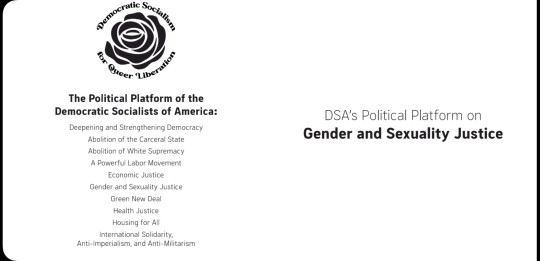
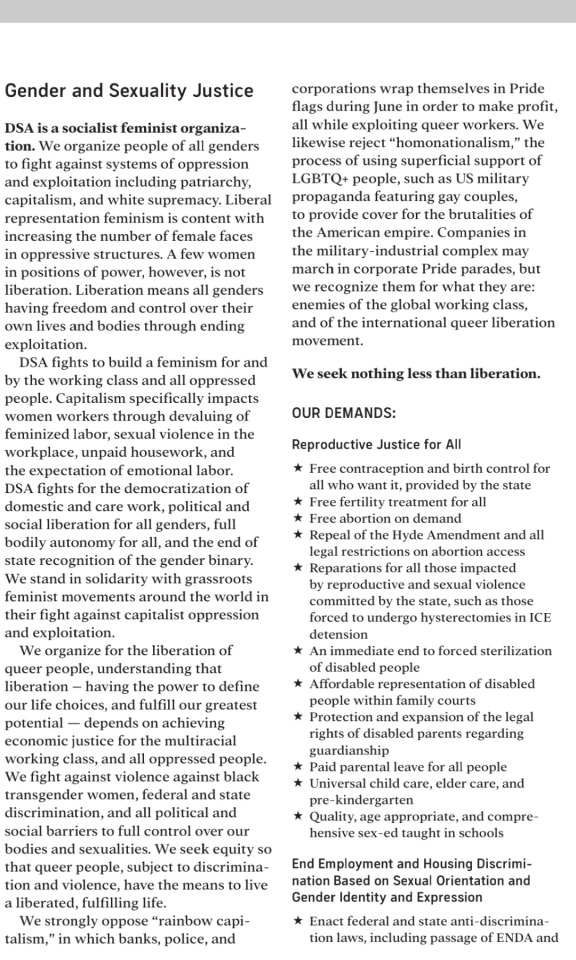
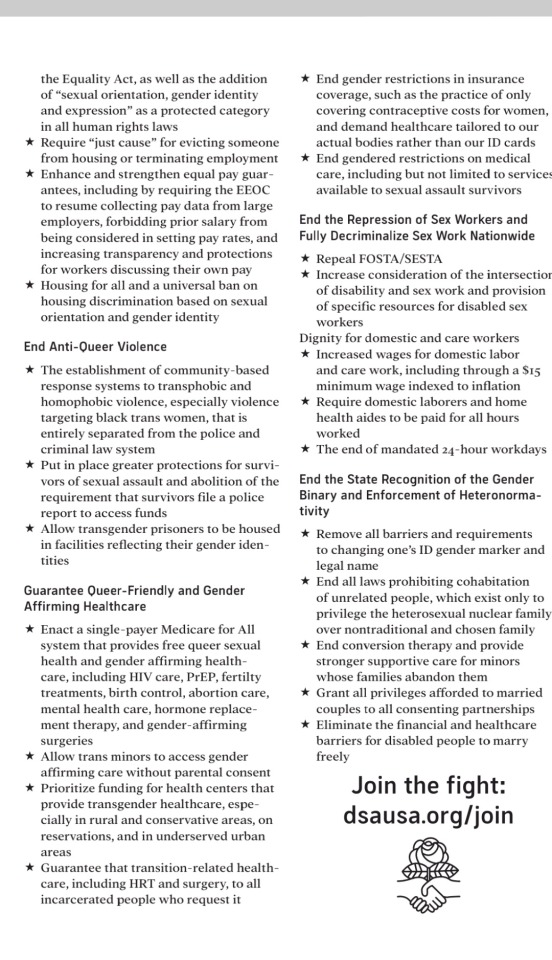
The Political Platform of the Democratic Socialists of America:
Abolition of the Carceral State
Abolition of White Supremacy
A Powerful Labor Movement
Economic Justice
Gender and Sexuality Justice
Green New Deal
Health Justice
Housing for All
International Solidarity,
Anti-Imperialism, and Anti-Militarism
DSA' Political Platform on
Gender and Sexuality Justice
DSA is a socialist feminist organization. We organize people of all genders to fight against systems of oppression and exploitation, including patriarchy, capitalism, and white supremacy.
Liberal representation feminism is content with increasing the number of female faces in oppressive structures. A few women in positions of power, however, is not liberation. Liberation means all genders having freedom and control over their own lives and bodies through ending exploitation.
DSA fights to build a feminism for and by the working class and all oppressed people. Capitalism specifically impacts women workers through devaluing of feminized labor, sexual violence in the workplace, unpaid housework, and the expectation of emotional labor.
DSA fights for the democratization of domestic and care work, political and social liberation for all genders, full bodily autonomy for all, and the end of state recognition of the gender binary.
We stand in solidarity with grassroots feminist movements around the world in their fight against capitalist oppression and exploitation.
We organize for the liberation of queer people, understanding that liberation – having the power to define our life choices, and fulfill our greatest potential — depends on achieving economic justice for the multiracial working class, and all oppressed people.
We fight against violence against black transgender women, federal and state discrimination, and all political and social barriers to full control over ourbodies and sexualities. We seek equity so that queer people, subject to discrimination and violence, have the means to livea liberated, fulfilling life.
We strongly oppose “rainbow capitalism,” in which banks, police, andcorporations wrap themselves in Pride flags during June in order to make profit, all while exploiting queer workers.
We likewise reject “homonationalism,” the process of using superficial support of LGBTQ+ people, such as US military propaganda featuring gay couples, to provide cover for the brutalities of the American empire. Companies in the military-industrial complex may march in corporate Pride parades, but we recognize them for what they are: enemies of the global working class, and of the international queer liberation movement.
We seek nothing less than liberation.
OUR DEMANDS:
Reproductive Justice for All
Free contraception and birth control for all who want it, provided by the state
Free fertility treatment for all
Free abortion on demand
Repeal of the Hyde Amendment and all legal restrictions on abortion access
Reparations for all those impacted by reproductive and sexual violence committed by the state, such as those forced to undergo hysterectomies in ICE detension
An immediate end to forced sterilization of disabled people
Affordable representation of disabled people within family courts
Protection and expansion of the legal rights of disabled parents regarding guardianship
Paid parental leave for all people
Universal child care, elder care, and pre-kindergarten
Quality, age appropriate, and comprehensive sex-ed taught in schools
End Employment and Housing Discrimination Based on Sexual Orientation and Gender Identity and Expression
Enact federal and state anti-discrimination laws, including passage of ENDA and the Equality Act, as well as the addition of “sexual orientation, gender identity and expression” as a protected category in all human rights laws
Require “just cause” for evicting someone from housing or terminating employment
Enhance and strengthen equal pay guarantees, including by requiring the EEOC to resume collecting pay data from large employers, forbidding prior salary from being considered in setting pay rates, and increasing transparency and protections for workers discussing their own pay
Housing for all and a universal ban on housing discrimination based on sexual orientation and gender identity
End Anti-Queer Violence
The establishment of community-based response systems to transphobic and homophobic violence, especially violence targeting black trans women, that is entirely separated from the police and criminal law system
Put in place greater protections for survivors of sexual assault and abolition of the requirement that survivors file a police report to access funds
Allow transgender prisoners to be housed in facilities reflecting their gender identities
Guarantee Queer-Friendly and Gender Affirming Healthcare
Enact a single-payer Medicare for All system that provides free queer sexual health and gender affirming healthcare, including HIV care, PrEP, fertilty treatments, birth control, abortion care, mental health care, hormone replacement therapy, and gender-affirming surgeries
Allow trans minors to access gender affirming care without parental consent
Prioritize funding for health centers that provide transgender healthcare, especially in rural and conservative areas, on reservations, and in underserved urban areas
Guarantee that transition-related healthcare, including HRT and surgery, to all incarcerated people who request it
End gender restrictions in insurance coverage, such as the practice of only covering contraceptive costs for women, and demand healthcare tailored to our actual bodies rather than our ID cards
End gendered restrictions on medical care, including but not limited to services available to sexual assault survivors
End the Repression of Sex Workers and Fully Decriminalize Sex Work Nationwide
Repeal FOSTA/SESTA
Increase consideration of the intersection of disability and sex work and provision of specific resources for disabled sex workers
Dignity for domestic and care workers
Increased wages for domestic labor and care work, including through a $15 minimum wage indexed to inflation
Require domestic laborers and home health aides to be paid for all hours worked
The end of mandated 24-hour workdays
End the State Recognition of the Gender Binary and Enforcement of Heteronormativity
Remove all barriers and requirements to changing one’s ID gender marker and legal name
End all laws prohibiting cohabitation of unrelated people, which exist only to privilege the heterosexual nuclear family over nontraditional and chosen family
End conversion therapy and provide stronger supportive care for minors whose families abandon them
Grant all privileges afforded to married couples to all consenting partnerships
Eliminate the financial and healthcare barriers for disabled people to marry freely
This pamphlet contains an excerpt from the Political Platform of the Democratic Socialists of America, ratified at the organization’s 2021 National Convention. The platform is a living document, up for amendment by our highest deliberative body, the national convention, every other year. You can read the current version of the full platform at ntdsa.org/nationaldsaplatform
Read the latest version of DSA’s full platform at
ntdsa.org/nationaldsaplatform
#us politics#democratic socalists of america#late stage capitalism#mutual aid#community organizing#trans rights#abortion rights#activism#political activist#political action#intersectional feminism#eat the rich#leftism#february 2024
11 notes
·
View notes
Text

For four decades, Supreme Court Justice Clarence Thomas has extolled the importance of “personal responsibility.” He has chastised those who “make excuses for black Americans” and argued there is a need to “emphasize black self-help.” He has denigrated affirmative action programs on the grounds that they “create a narcotic of dependency” where there should be “an ethic of responsibility and independence.” He bemoans the “ideology of victimhood” that allows the marginalized to “make demands on society for reparations and recompense.”
In light of recent revelations that Thomas has been showered by billionaire Harlan Crow with over two decades’ worth of getaways on superyachts and private jets and various other gifts, none of which he ever reported, the jurist’s long con of principled advocacy for Black self-reliance and opposition to white largesse has finally run its course. Turns out, Thomas was never against reparations—he just wanted them for himself. He is and always has been precisely what he wrongly accuses Black folks of being.
It’s been a con run by a self-serving fabulist all along.
(continue reading)
#politics#republicans#scotus#clarence thomas#harlan crow#gop hypocrisy#black republicans#sellouts#bootstrap theory
47 notes
·
View notes
Text
After Black Lives Matter - CEDRIC G.JOHNSON
THIS BOOK IS A FREE DOWNLOAD FROM THE BLACK TRUEBRARY CLICK THE TITLE TO DOWNLOAD
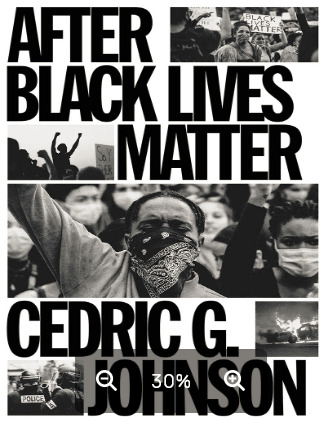
Contemporary policing reflects the turn from welfare to domestic warfare as the chief means of regulating the excluded and oppressed The historic uprising in the wake of the murder of George Floyd transformed the way we think about race and policing. Why did it achieve so little in the way of substantive reforms? After Black Lives Matter argues that the failure to leave an institutional residue was not simply due to the mercurial and reactive character of the protests. Rather, the core of the movement itself failed to locate the central racial injustice that underpins the crisis of policing: socio-economic inequality. For Johnson, the anti-capitalist and downwardly redistributive politics expressed by different Black Lives Matter elements has too often been drowned out in the flood of black wealth creation, fetishism of Jim Crow black entrepreneurship, corporate diversity initiatives, and a quixotic reparations demand. None of these political tendencies addresses the fundamental problem underlying mass incarceration. That is the turn from welfare to domestic warfare as the chief means of regulating the excluded and oppressed. Johnson sees the way forward in building popular democratic power to advance public works and public goods. Rather than abolishing police, After Black Lives Matter argues for abolishing the conditions of alienation and exploitation contemporary policing exists to manage.
Review
"A virtuoso performance! Weighing the successes and limitations of Black Lives Matter, Johnson concludes that identity-based mobilization—confusing what people look like with what they need—cannot substitute for majoritarian political coalition-building." —Barbara J. Fields, Columbia University "A brilliant scholar who is first and foremost concerned with equality and justice. It’s those very commitments that lead him, in After Black Lives Matter, to question today’s antiracism and its nostrums." —Bhaskar Sunkara, founding editor of Jacobin and author of The Socialist Manifesto "Essential reading for those weary of platitude-driven texts on race and criminal justice and in the market for an empirically grounded political analysis that points to practicable solutions to one of the biggest problems of our day." —Touré F. Reed, author of Toward Freedom "A provocative and expansive critique from the left of the loose collection of protest actions, organizations, and ideological movements-whether prison abolition or calls to defund the police-that make up what we now call Black Lives Matter...After Black Lives Matter should be commended both for the clarity of its message and the bravery of its convictions." —Jay Caspian Kang, New Yorker
About the Author
Cedric Johnson is professor of African American Studies and Political Science at the University of Illinois at Chicago. His book, Revolutionaries to Race Leaders: Black Power and the Making of African American Politics was named the 2008 W.E.B. DuBois Outstanding Book of the Year by the National Conference of Black Political Scientists. Johnson is the editor of The Neoliberal Deluge: Hurricane Katrina, Late Capitalism and the Remaking of New Orleans. His 2017 Catalyst essay, “The Panthers Can’t Save Us Now: Anti-policing Struggles and the Limits of Black Power,” was awarded the 2018 Daniel Singer Millenium Prize. Johnson’s writings have appeared in Nonsite, Jacobin, New Political Science, New Labor Forum, Perspectives on Politics, Historical Materialism, and Journal of Developing Societies. In 2008, Johnson was named the Jon Garlock Labor Educator of the Year by the Rochester Central Labor Council, AFL-CIO. He previously served on the representative assembly for UIC United Faculty Local 6456.
Excerpt. © Reprinted by permission. All rights reserved.
Given the sheer scale, magnitude and diversity of 2020’s resurgent Black Lives Matter protests, many pundits, scholars and activists celebrated the George Floyd rebellion as an historic watershed, one where the possibility of real reform came into view. For too many, however, the euphoria of the moment suspended any criti- cal analysis of what it all meant. This is a deeper problem on the US left—the tendency to read protests as always prefigurative rather than contingent, and as a manifestation of real power rather than a reflection of potential. Such wish-fulfillment think- ing, however, forgets that mass mobilization is not the same as organized power, and that mass mobilization is much easier now with the endless opportunities for expressing discontent provided by social media, online petitions, memes and vlogging.
The scale of protests can be misleading, and their actual effectiveness, regardless of their size, is dependent on historical conjunctures, such as the balance of political forces, the organized power and capacity of opposition and the clarity of objectives among activists. Throughout the opening decades of this century, ever larger protests have proved incapable of consolidating in a manner that might effectively oppose ruling-class prerogatives. In recent memory, we have witnessed successive mass protests—turn-of the-century demonstrations against global capitalism, protests against the Bush administration’s so-called War on Terror, Occupy Wall Street encampments, anti-eviction campaigns, the March for Our Lives following the Parkland High School mass shooting, protests against police violence and ICE deportations, among others—but these have done little to depose capitalist class power and the advancing neoliberal project.
If anything, the hegemony of finance capital, the war-making powers of the national security state, the criminalization of immigration, the power of the gun lobby and the unaccountability of police are as entrenched as ever. THIS BOOK IS A FREE DOWNLOAD FROM THE BLACK TRUEBRARY
3 notes
·
View notes
Text
another nwo/wef wealth transfer and bankrupting of America plan
24 notes
·
View notes
Text
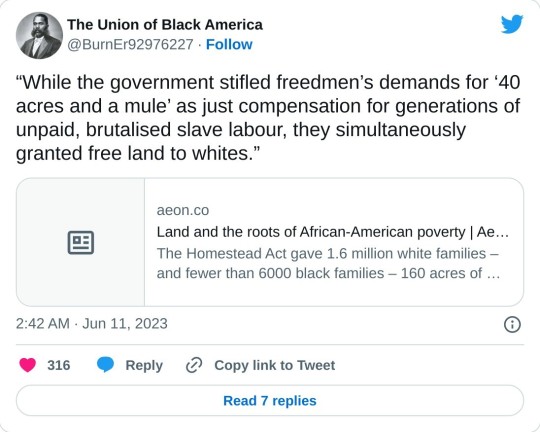
Land and the roots of African-American poverty
Keri Leigh Merritt
is a historian and independent scholar. Her research focuses on race and class in US history. Her first book, Masterless Men: Poor Whites, Slavery, and Capitalism in the Deep South, will be published by Cambridge University Press next year.
Edited by Sam Haselby
900 words

African-American family at the Hermitage, Savannah, Georgia in 1907. Photo courtesy of the Library of Congress
Shortly after emancipation in 1865, African Americans began fighting for the rights to the lands they had long worked – cultivated by their hands, fed by their sweat, and stained by their blood. Yet while the government stifled freedmen’s demands for ‘40 acres and a mule’ as just compensation for generations of unpaid, brutalised slave labour, they simultaneously granted free land to whites.
Indeed, when the failure of land distribution among blacks during the Reconstruction is judged within the context of the Homestead Acts, the reality of the situation is laid bare. The problem was never the radical nature of land reform. The problem was racism.
When judged comparatively with other nations’ emancipatory histories, the Reconstruction experience in the United States is unique. While African Americans were the only freed slaves to be granted political rights so soon after emancipation, those rights were limited for a people without capital or job prospects. Land would have served as the primary source for reparations.
President Abraham Lincoln signed the original Homestead Act into law during the second year of the Civil War. Between 1868 and 1934, it granted 246 million acres of western land – an area close to the land mass of both California and Texas – to individual Americans, virtually for free. To receive 160 acres of government land, claimants had to complete a three-part process: first, file an application. Second, improve the land for five years. Third, file for the deed of ownership.
Because of the date of the Act’s passage, few people from the South initially received any benefit from it. Yet given that it effectively remained in place until 1934, well over 1.5 million white families – both American-born and immigrant – eventually profited from it. And, although the process was rife with fraud, as many homesteaders sold their plots to corporations, the original claimants pocketed the income from land sales, establishing a basis of wealth and capital. By the end of the Act, more than 270 million acres of western land had been transferred to individuals, almost all of whom were white. Nearly 10 per cent of all the land in the entire US was given to homesteaders for little more than a filing fee.
Enacted in 1866 shortly after the end of the Civil War, the Southern Homestead Act (SHA) was supposed to function much like the original Act. During the first year of the SHA, unoccupied southern land was offered exclusively to African Americans and loyal whites, but after 1867 even landless former Confederates applied.
Although the SHA ostensibly offered a solution to several pressing Reconstruction-era issues, in reality, a large percentage of the land offered was un-farmable, being either heavily wooded or covered with swamps. Furthermore, it was hard to administratively arrange homesteading, as many southern states had only one land office. Depending on where the office was located, it could take several weeks to simply make the trip, meaning the bureaucratic duties cost far more than the filing fees for the actual land.
Furthermore, the recently emancipated owned no cash and had no experience in dealing with the government, rendering the process even more difficult. But perhaps the biggest hurdle for freedpeople involved the year-long labour contracts they had been cajoled or forced into signing shortly after slavery was outlawed. Leaving a job before the end date of a contract frequently resulted in virtual re-enslavement on a chain gang. Indeed, blacks had been locked into these contracts until the very date (1 January 1867) that they stopped receiving special homesteading benefits.
By the end of the SHA 10 years later, nearly 28,000 individuals had been awarded land. Combined with the claimants of the original Homestead Act, then, more than 1.6 million white families – both native-born and immigrant – succeeded in becoming landowners during the next several decades. Conversely, only 4,000 to 5,500 African-American claimants ever received final land patents from the SHA.
The Homestead Acts were unquestionably the most extensive, radical, redistributive governmental policy in US history. The number of adult descendants of the original Homestead Act recipients living in the year 2000 was estimated to be around 46 million people, about a quarter of the US adult population. If that many white Americans can trace their legacy of wealth and property ownership to a single entitlement programme, then the perpetuation of black poverty must also be linked to national policy. Indeed, the Homestead Acts excluded African Americans not in letter, but in practice – a template that the government would propagate for the next century and a half.
With the advent of emancipation, therefore, blacks became the only race in the US ever to start out, as an entire people, with close to zero capital. Having nothing else upon which to build or generate wealth, the majority of freedmen had little real chance of breaking the cycles of poverty created by slavery, and perpetuated by federal policy. The stain of slavery, it seems, is much more widespread and lasting than many Americans have admitted. Yet it is the legacy of the Reconstruction – particularly the failure of land redistribution – that so closely coupled poverty and race in the US.
#Land and the roots of African-American poverty#systemic racism#american hate#disinfranchisement#racism#white supremacy#land#homesteads act#emancipation#reconstruction#southern homesteads act#civil war
13 notes
·
View notes
Text
Title: How to Live Free in a Dangerous World: A Decolonial Memoir Author: Shayla Lawson Publication Year: 2024 Publisher: Tiny Reparations Books Genre: nonfiction, memoir
Spanning across multiple countries and continents, Lawson’s memoir is more than that; it also is a manifesto of sorts, with a demand that we each deeply reflect on our complex identity and positionality in the world. Lawson, a Black American who is nonbinary, femme, disabled, and queer, draws heavily from their own traveling experiences to reflect on their identity on all fronts. One thing I particularly appreciated was how Lawson grappled with being from the United States and what that means in other countries. This is further complicated when they bring Blackness into the picture, and I found their reflections quite profound to the point that I was deeply reflecting on my own identity and how race and nationality shaped my experiences when I also lived abroad.
While Lawson’s memoir takes the reader through Africa, Asia, Central America, Europe, and the Caribbean, many chapters also focus on their experiences in different regions of the United States, which makes sense, considering how vastly different each region can be. While the themes and locations are incredibly diverse, I was really impressed that Lawson found a thread through all of them, especially in the way they stepped back to think about the world as a whole.
Written with deep gratitude, humility, and a sense of wonder, Lawson’s reflections are so welcomed in the way they challenge us to think about our place in the world and the existing potential to make it a better place.
Content Warning: racism; death; chronic illness; colonization; ableism; grief; slavery; misogyny; references to suicide (including assisted suicide), war, infidelity, trafficking, police brutality, pandemic, and misgendering
#Shayla Lawson#How to Live Free in a Dangerous World#book review#nonfiction#memoir#2024 reads#booklr
2 notes
·
View notes